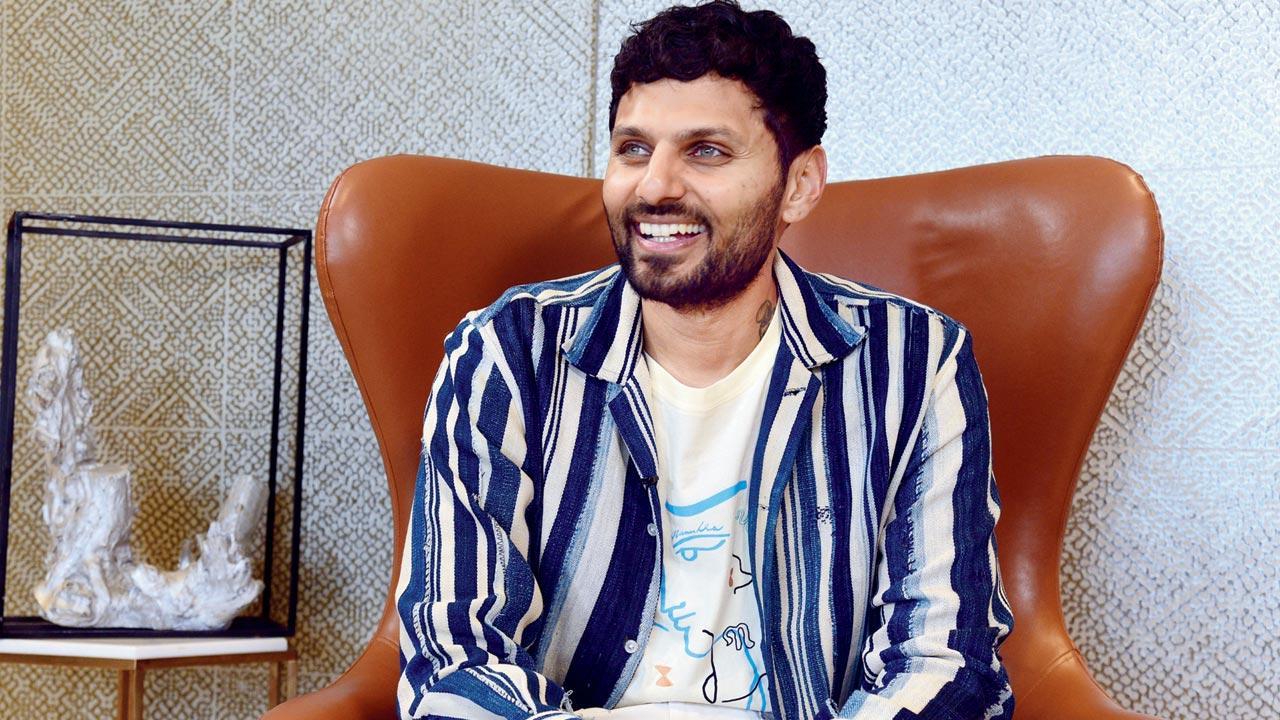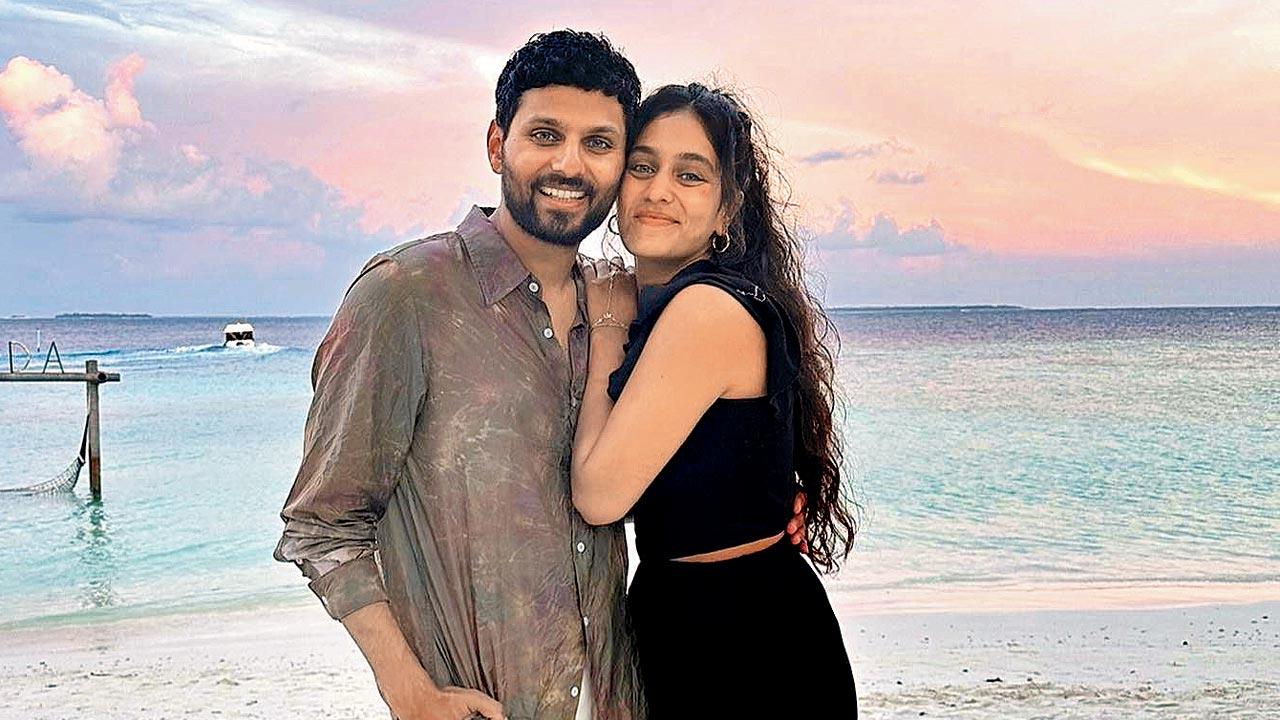LA author Jay Shetty who officiated JLo and Affleck’s fairytale wedding, tells us that romance is one-part chemistry and four-parts work

Shetty was visiting Mumbai from Los Angeles last week to promote his new book which draws up eight rules to perfecting love. Pic/Ashish Rane
Love, phew! As you grow older, and by when it’s likely that you’ve tolerated the insouciance of many heartbreakers, the idea of romantic love may rarely make you smile. Nor do the love stories of Nicholas Sparks or Danielle Steel, and Nora Ephron, in particular, whose rom-coms were known to melt even the steely. By this time, you may have noticed that I’ve dropped the word “love” four times already. Believe me, I’m exhausted too. The disillusionment is real.
As I take the elevator to the 21st floor of Taj Lands End in Bandra West, with Jay Shetty’s 8 Rules of Love: How to Find it, Keep it and Let it go (Thorsons, HarperCollins) sitting in my hands, I am fearing that my own judgment about “love” will cloud the impending interview. Los Angeles-based Shetty, who I meet in one of the suites, is no stranger to this disenchantment. The 35-year-old author, podcaster and former monk grew up on a diet of Hollywood and Bollywood mush. “I loved those movies, and I thought that’s what love looked like,” he says, laughing while recalling being ruined by the Shah Rukh Khan-Madhuri Dixit-Karisma Kapoor starrer Dil To Pagal Hai (1997). “And so, when I first started seeing my wife [vegan, plant-based chef and entrepreneur Radhika Devlukia-Shetty] and going on dates, I was always trying to do what I saw in the movies... it had to be flowers at the door, or a beautiful restaurant and a fancy dinner. Radhi would tell me, ‘we could have just stayed home, and made a sandwich or something’.”
 Podcaster-author Jay Shetty with wife Radhika Devlukia-Shetty, a vegan, plant-based chef and entrepreneur. Pic/Facebook
Podcaster-author Jay Shetty with wife Radhika Devlukia-Shetty, a vegan, plant-based chef and entrepreneur. Pic/Facebook
Shetty confesses that he wanted a fairytale-like romantic love. “But that’s not often the kind of love you find with someone,” he realises now. “I know people who’ve told me that ‘I didn’t find the love that they show in the movies, so maybe I didn’t experience real love’. That’s not true. You can find love in a much more satisfying way.”
His new book that’s already making it to international bestselling lists, breaks down this idea for us, in stages and rules. His inspiration was the Vedas. “During my time as a monk, I spent all my time studying Indian literature and scriptures, and ancient traditions,” says Shetty, who was raised in north London, but drawn by the teachings of his guru, Gauranga Das, moved bag and baggage to live at Das’ eco-village in Wada, Palghar, after graduating from college. “All I did was look at these texts from the lens of the modern world. I realised that the books were relevant, but the language may have been older. What I have done is taken those amazing frameworks and concepts, and given them a new home.” In the book, Shetty employs the four stages of life in the Vedas to explore the different levels of love—brahmacharya ashram (preparing for love), grhastha ashram (practising love), vanaprastha ashram (protecting love) and sannyasa ashram (perfecting love). From this emerges his rule book to loving. “The reason I do that is because I feel that the way the Vedas think about the world is fascinating. Everything is systematic, structured and intentional. I like to fall back on something more systematic and strategic, because it helps me make better life decisions.”
Each one of us, says Shetty, is worthy of love. But for that, you need to put in the effort. “I think we want love to be a feeling, but in reality, it is work. There’s nothing in the world that sustains without work. The idea that love is a feeling also sometimes makes us accept abuse and toxicity in relationships. We hold on to someone, even if they treat us badly, because we are reminded of how good it felt that one particular day, and how they were good to us in that one moment, no matter how terrible they were for the rest of the time. That can be quite dangerous.”
Love, he says, is “commitment, consistent action and repeated positive behaviour”. “And often, that doesn’t feel magical or cool, but it’s far more fulfilling to the heart and is more real,” he explains, adding that you need to inculcate habits for love, to show another person how much you love them. “And you need to inform them about how they can love you.” No mind games, he stresses.
This begs me to ask him about chemistry, the butterflies in the stomach—vibe, as a few call it—which makes two people attracted to each other. “That’s the most short-lived experience of love,” he shares. “Chemistry is all about newness... it’s basically a chemical reaction, where you are experiencing both, excitement and stress [about getting to know this person]. Science shows that as you get more comfortable in this person’s company, stress drops, because you like being with them. Many worry when the excitement is gone, but what it is really is you becoming more comfortable with the person.” According to Shetty, what’s more important is compatibility and character. “It’s not whether you feel love or not. It’s more about whether I understand this person’s character, do I know how this someone feels when stressed or upset, and am I okay with how they behave. Do I feel cared for by this person. I would encourage people to look more deeply at this rather than chemistry, because that’s what carries a relationship through in the long-term.”
But before you can even start loving, Shetty advices—and that’s rule no.1 as well—that people learn to appreciate their solitude. Why is this process so important, I ask. “Most people think that being single makes them unworthy, especially when we get older—we start to feel that it’s because we are imperfect, inadequate, unwanted or unattractive. Also, when we feel lonely, we tend to get desperate and rush into a bad relationship. Studies have shown that when you are lonely, you are more likely to settle for less than you deserve, more likely to become co-dependent, and even struggle to break up, even if someone is not good for you. We make bad decisions when we are lonely.” Real loneliness, he says, is when people don’t feel seen, heard and understood. “I am encouraging people to see, hear and understand themselves.” Only when you connect with yourself, says Shetty, can you connect with others. “That’s how you attract goodness.”
Shetty, who officiated his friends, Hollywood actors Jennifer Lopez and Ben Affleck’s wedding last year, says it was overwhelming to witness love up-close. “We always see the end as a fairytale, nobody is talking about the journey. Theirs [Lopez and Affleck] is a journey of growth, learning, missing each other and being separated for so many years. It’s a journey of so much individual and collective growth,” he says, adding, “Anyone who looks happy, chances are that they really worked hard to get there.”
With ideas about love evolving—words like exclusive, polyamory now part of dating lingo—Shetty says, we now have a deeper vocabulary around love. “Sometimes, it’s seen as making things complex, but it actually helps people make healthier choices,” he thinks.
What complicates love is being inundated with options, a fallout of modern online dating. “We often tend to ruin good opportunities online, because we think there are plenty more fish in the sea. Humans make bad choices, when we have too much of something. If we are dating online, we need to stop treating people like items in a shopping mall. If you are shopping for love, and you keep doing exchanges and returns, it’s unhealthy, because we hurt people’s emotions and feelings, and set ourselves on a quest that will never end. The truth is, there’s no perfect person... it’s never going to be easy with anyone, it’s always about you being enthusiastic to make it work with someone.”
And how do you know when you’ve reached the end of your tether with love? “You know that love is over, when you’re becoming a person you don’t want to be; when you are falling out of love with yourself while trying to fall in love with another, and when you don’t feel like putting energy into that relationship,” says Shetty, while cautioning against giving up too soon. “You have to be patient with yourself and those you love.”
Watch: Valentine’s Day Special: Ex-monk And Author Jay Shetty's Tips On Love And Relationships
Also Read: Oxytocin: All you need to know about the love hormone
 Subscribe today by clicking the link and stay updated with the latest news!" Click here!
Subscribe today by clicking the link and stay updated with the latest news!" Click here!










